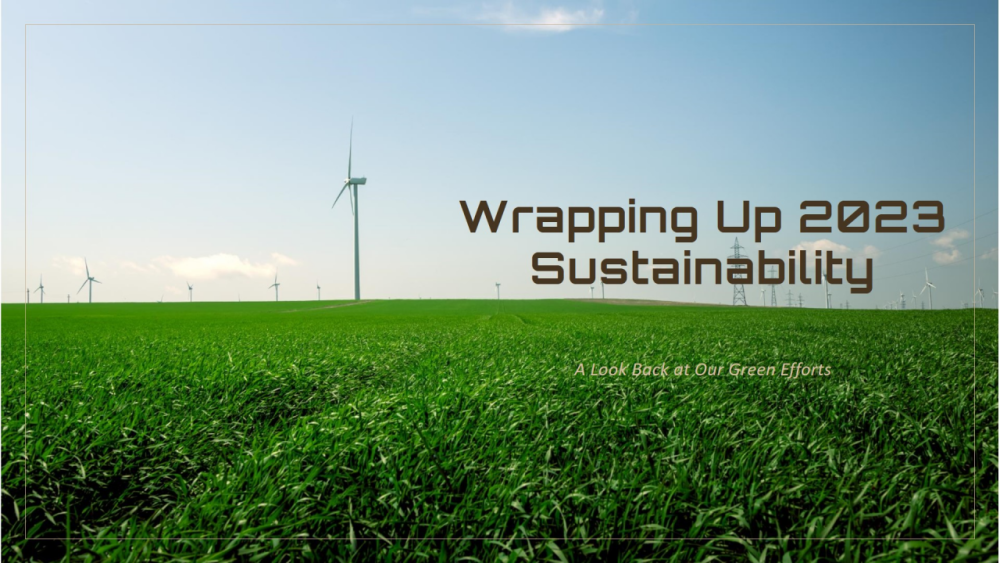2023 Sustainability Wrap Up
03 Jan 2024

- The Vegan or Vegetarian diet
In 2023, it was recorded that the number of people adopting a plant-based diet was the highest it has ever been across the world with 14% of people in the UK following a meat-free diet. This has a significant impact on sustainability, given that agriculture is estimated to be responsible for 47% of the UK's methane emissions, 68% of the UK's nitrous oxide emissions, and 2% of the UK's carbon dioxide emissions. Methane being the gas produced by cows, which has a major impact on global warming. With a reduction in meat consumption, the amount of this gas released into the atmosphere should decrease due to the lower demand.
- Food Waste Reduction
It has been reported that around one third of food goes to waste each year, this has a major impact on soil & water quality and contributes to landfill sites. More UK residents now have access to food bins, which helps to ensure that food that is compostable and appropriately discarded to be turned into compost, fertiliser, or used to generate energy: two in five people during 2023 used food waste bins (39%) and attitudes towards food waste recycling are positive with 85% of people agreeing it’s their responsibility to recycle food. In addition, more supermarkets are implementing food recycling schemes allowing discarded food to be given to those in need or sold by brands like Too Good to Go at a heavily discounted cost: all contributing to less food waste.
- Renewable Energy Sources
People are becoming increasingly aware of the energy sources that they use and where the energy comes from, with more brits choosing to utilise brands such as Octopus Energy who have a clear focus on using renewable, sustainable energy. In 2023 they grew their customer base to 3 million and offer fair priced energy along with perks for using less energy during busy grid times to minimise fossil fuel power usage. In addition, it is becoming more popular for consumers to utilise sustainable energy via solar panels and heat pumps (which reduce carbon emissions by 80%), with solar installations up 114% YOY and the number of heat pump installations also rising, with more than 37,000 air-source and ground/water-source installations, up from 30,000 in 2022.
- Recycling
Now this may seem like one that’s been around for decades, but in recent years there has been more of a focus on it: it’s more easily accessible and there are more options provided to UK residents for utilising glass, plastic & paper recycling at home and there has been an increase in the number of public recycling bins. We know that 90% of people in the UK regularly recycle now and it is considered ‘the norm’ in the UK with the top recycled product being cardboard or paper. The majority of those who do not recycle are over the age of 55, demonstrating a shift in behaviour among younger generations.
Reuse & Repurpose
Another trend that has seen an increase in 2023 is the use of second-hand products. This ranges from finding new ways to utilise items that are no longer fit for their original purpose, such as using a glass bottle as a candle holder, to purchasing products that are no longer wanted by the original owner, such as clothing sold on the likes of Vinted. Not only is reusing/repurposing items more sustainable, but usually it is cheaper and can be a creative, fun thing to do, especially when coming up with ideas on how to repurpose such as a ladder bookcase, or a tennis racket mirror!
- Transport
From more electric/hybrid vehicles to cheaper public transport, 2023 has been a year of encouraging the nation to utilise more sustainable means of transport. Numbers are yet to be finalised for 2023, but it was predicted that electric car sales would continue to grow globally with a 35% YOY increase forecast, harnessing 18% of all car sales. First Bus reduced their costs this year in many regions, with the introduction of more clean air zones and an encouragement to use more sustainable means of transport when commuting. Councils have also made cycling routes easier, introducing more cycle lanes in big cities and workplaces implementing incentives for cycling to work, driving a surge in those choosing to cycle rather than drive.
- Sustainable Materials
People are increasingly conscious of the materials used to make products, we have already seen less plastic use for packaging items, the famous straws(!) and clothing made from natural materials using renewable energy. Consumer demand for sustainable fashion has increased: according to a survey conducted by First Insight, two-thirds of global consumers are willing to pay more for sustainable products. In October 2023 a ban on single use plastic was introduced across the UK, which is set to have a significant impact: this is part of the Government’s wider world-leading action to tackle the scourge of plastic pollution and eliminate all avoidable plastic waste by 2042.
- Remote Working
A trend forced upon us during the pandemic, and one that might not necessarily seem to relate directly to sustainability yet has a major impact on carbon emissions with less travel, lower business costs with less face-to-face meetings accepted as ‘the norm’ and generally a more sustainable way of working. Remote workers can have a 54% lower carbon footprint compared with onsite workers, according to a new study by Cornell and Microsoft, with lifestyle choices and work arrangements playing an essential role in determining the environmental benefits of remote and hybrid work. Hybrid workers who work from home two to four days per week can reduce their carbon footprint by 11% to 29%.
- Brand Responsibility
In recent years, there has been a noticeable increase in the number of brands with sustainability goals and they are all talking about it! There are more sustainable brands to choose from, ranging from ‘Who Gives a Crap’ toilet tissue to Smol laundry products: consumer demand for these sustainable options is growing and we see more brands committing to the 2030 Sustainable Development Goals and becoming BCorp businesses. Something to be mindful of however is ‘green washing’ which is where green marketing is deceptively used to persuade the public that an organization's products, aims, and policies are environmentally friendly when in fact they are not.
- Government Goals
A major influence on sustainability goals for the nation is of course the government and their goals to provide services, implement laws and work towards reducing the impact of global warming. In 2023, the UK government published their Environmental Improvement Plan. The plan is to halt the decline in our biodiversity so we can achieve thriving plants and wildlife and currently we have created or restored wildlife habitats the size of Dorset and are investing more than £750 million in tree-planting and peatland restoration through the Nature for Climate Fund, in addition we have established a network of marine protected areas across 35,000 square miles of English waters. All steps in the direct direction.
That’s a wrap! What do you think will be a major impact on sustainability in 2024?
Written by Jodie Hanrahan, Join the Dots
Sources:
https://www.greenmatch.co.uk/blog/sustainability-trends
https://ahdb.org.uk/knowledge-library/greenhouse-gas-emissions-agriculture
https://www.businesswaste.co.uk/your-waste/food-waste/what-happens-to-food-waste/
https://www.solarpowerportal.co.uk/uk-solar-installations-on-course-to-break-all-time-record-in-2023
https://www.coolingpost.com/uk-news/uk-heat-pump-installations-rise-again
https://wrap.org.uk/resources/report/recycling-tracker-survey-spring-2023
https://www.missoma.com/blogs/the-chain/upcycling-recycling-statistics
https://www.boredpanda.com/creative-reuse-upcycling-repurposing-ideas/
https://evmarketsreports.com/global-ev-outlook-2023-2/
https://3dlook.ai/content-hub/sustainable-fashion-trends-to-watch-in-2023/
https://deframedia.blog.gov.uk/2023/10/02/coverage-of-the-introduction-of-restrictions-on-a-range-of-single-use-plastics/
https://news.cornell.edu/stories/2023/09/lifestyle-impacts-green-benefits-remote-work
https://assets.publishing.service.gov.uk/media/64a6d9c1c531eb000c64fffa/environmental-improvement-plan-2023.pdf

Please login to comment.
Comments